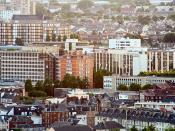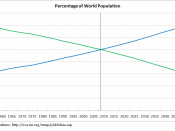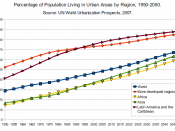According to the English dictionaries, urbanization is referring to "the process by which more and more people leave the countryside to live in cities" (Webster, 2008). Historically, growth in economic activities has conceived many mega cities as well as social problems due to the migration of a rural work force in search of a better livelihood.
Social costs of urbanization are mainly caused by massive increases in population of cities at certain periods. Main causes for such urban problems are population growth and the inability of governments to provide basic services such as clean water. The BBC television (2006) announced that the United Nations estimated about 180,000 people are added to the urban areas on a daily bases (BBC website, 2006). Good introduction Urbanization and PovertyIncreased urbanization, especially in developing countries such as China and India, has caused problems such as pollution, pressure on resources and urban unemployment. According to the BBC website (2006), developing countries are carrying the mass of this burden by themselves, are left struggling to deal with the huge influx of people into urban areas.
Social costs also include pollution and deterioration of quality of life. The city has limited resources such as land, housing, and roads to support community life, therefore, rapid increase in population causes higher cost of living in the cities. Even if the economy is growing, massive migration of people from rural areas flood the urban job market. Such excess supply of unskilled labor and limited job opportunities cause fall of wages and higher urban unemployment. Due to massive increase in demand for jobs, migrated populations from villages have to work at subsistence level informal jobs that are outside formal labor market (UNEP, 2006).
Higher costs of living and limited incomes cause a fall in the standard of living of...



Very good
A well organized and explained essay
0 out of 0 people found this comment useful.